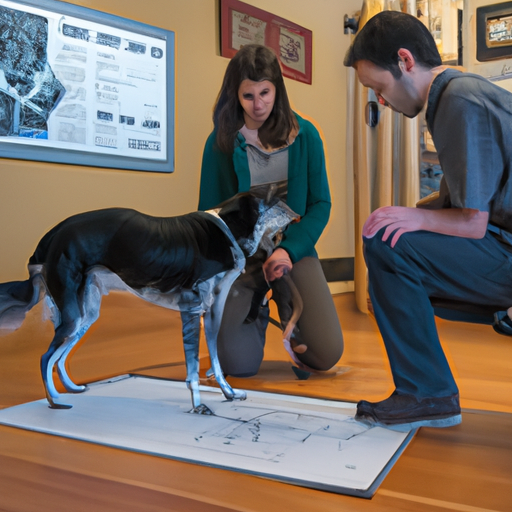As a dog parent, noticing your furry friend’s back legs shaking can be alarming. This post will guide you through understanding why this might be happening and what you can do about it.
1. Understanding Your Dog’s Behavior
Dogs communicate in various ways, and sometimes, body language is their form of expression. A shaking leg might not necessarily mean there’s something wrong. It could be a simple reaction to excitement or cold, or it could be a symptom of an underlying health problem.
- Excitement: Just like humans, dogs can tremble when they are excited or anxious. This is often temporary and will stop once the excitement subsides.
- Cold: Dogs can shiver when they are cold. This is a natural response to warm the body.
However, if your dog’s leg shaking is frequent and doesn’t seem to be linked to their environment or emotional state, it’s crucial to delve deeper and potentially consult a vet.
2. Medical Reasons Behind The Shaking
Various medical conditions can cause tremors in dogs. Some of these include:
- Degenerative Myelopathy: This is a severe disease affecting the spinal cord, often leading to weakness and shaking in the hind legs.
- Hip Dysplasia: This is a common condition in certain breeds, causing pain and shaking in the back legs.
- Arthritis: Older dogs often suffer from arthritis, which can cause shaking due to pain and discomfort.
| Condition | Symptoms | Breeds Frequently Affected |
|---|---|---|
| Degenerative Myelopathy | Weakness in Back Legs, loss of coordination | German Shepherds, Corgis |
| Hip Dysplasia | Difficulty standing up, limping | Labradors, German Shepherds |
| Arthritis | Reluctance to move, limping | Labradors, Retrievers |
3. Nervous System Disorders
Sometimes, the shaking could be a result of nervous system disorders. Conditions such as General Tremor Syndrome (GTS) or White Shaker Dog Syndrome can cause tremors in various parts of the dog’s body.
4. What Should You Do?
If your dog’s back legs are shaking consistently, it’s time to consult a vet. They will conduct a thorough examination to determine the underlying cause. Depending on the diagnosis, treatment options can range from medication and physical therapy to surgery in severe cases.
5. Preventive Measures
While not all causes of leg shaking are preventable, maintaining your dog’s overall health can help.
- Balanced diet: Ensure your dog is eating a well-balanced diet to maintain healthy weight and bone health.
- Regular exercise: Regular physical activity can help keep your dog’s muscles strong and flexible.
- Regular vet check-ups: Routine veterinary examinations can help identify potential issues early.
FAQs
Q1: Should I be worried if my dog’s back legs are shaking?
It depends on the frequency and severity. If it’s occasional, it might be due to excitement or cold. But if it’s frequent or severe, consult a vet.
Q2: Can I treat my dog’s leg shaking at home?
It’s crucial to get a diagnosis from a vet before attempting any treatment at home.
Q3: Can puppies have shaking back legs too?
Yes, puppies can also experience back leg shaking. It could be due to excitement, cold, or certain health conditions.
Q4: How can I help my dog if they have arthritis?
There are various treatments for arthritis in dogs, including medication, physical therapy, and lifestyle changes. Your vet will guide you based on your dog’s specific needs.



